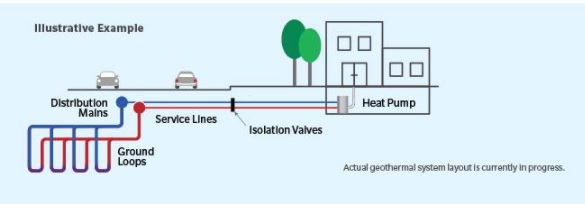Here’s an idea for Concord as it tries to cut its carbon emissions: Swap individual gas furnaces in buildings for a city-wide heating system fueled by a renewable source. Pull that off and we’d be the envy of the net-zero world!
Yes, that’s sarcasm – and painful sarcasm, at that.
The Capital City had exactly this system for 79 years until private Concord Steam was allowed to go bankrupt in 2017, at which point Concord did a major climate backpeddle, replacing wood-fired district heating with scads of natural-gas furnaces.
I’m not bringing this up just to anguish over memories, however. Eversource is running an experiment in Massachusetts that holds out hope of creating an even better version.
The project in the Boston suburb town of Framingham looks to create a district heating network that uses electric heat pumps – the extra-efficient geothermal kind that draws heat from underground rather than just the air – to produce heat or cooling in roughly 100 homes and businesses. They’ll be signing up people who currently use natural gas for heating and air conditioning or even electric technologies other than heat pumps.
I’ve previously ranted a bit about the value of electric heat pumps in the fight against climate change because of their innate efficiency and their use of an electric grid that can be cleaned up, unlike the natural-gas grid or heating-oil supply chain. But I’ve only looked at the individual-building level. Doing this at the district level is an exponential leap, hence the Eversource pilot, which should start construction this summer and run for three years. It will run water through pipes under streets, going from a few clusters of deep wells to buildings that will use it to increase the efficiency of their heat pumps.
It’s a pilot not so much of the well-established technology although there are complications to be worked out, like finding companies to drill 150 boreholes in a short time for the vertical closed-loop piping that will draw out heat, and measuring the long-term effect on underground temperatures that could lower efficiency.
The real point of the pilot is to test the ability to coordinate usage of heat and cooling in buildings as a single network, creating lower energy consumption and costs without lowering customer happiness.
“We hope this first and foremost reduces the demand,” said Nikki Bruno, Eversource’s director of clean technology for natural gas in Massachusetts and Connecticut. “The technology itself has been proven, in Europe they do more of a district approach, a centralized point for heating/cooling. … What hasn’t been done is doing it in a networked fashion.”
As an example of the benefits that a centralized network can provide, project manager Eric Bosworth pointed to an idea long proven in the electric grid: time-shifting demand from one part of the network to another to limit the total need at any single moment.
“We can leverage some of the off-peak hours for different buildings,” he said. “Office (needs) rises at 9 a.m., when residential usage is dropping off. If you add up all the load it comes to one value, but you never see that peak load.”
It’s also cheaper to drill clusters of wells for a large, distributed ground-based system than an individual bore hole for every single building.
The pilot will try to answer three questions, Bruno said.
“Is this fiscally responsible?” In other words, can Eversource make enough money to keep going?
“Is there environmental value?” Does it actually reduce the environmental impact of heating and cooling those buildings?
“Does this satisfy what the customer needs and wants?”
The last point is key, Bruno said. If it ends up costing customers too much or the installation proves to be a pain or people decide they don’t really like the use of the individual units called mini-splits, then it will fizzle. “Customer adoption could make or break it,” Bruno said.
You may ask, why Framingham? That’s because it’s a relatively dense community, with lots of potential customers close together but also, importantly, because Eversource provides both its electricity and natural gas. This simplifies billing and customer acquisition and also takes advantage of two corporate skill sets; electric for the centralized heat pumps, and drilling and pipe work for distribution of the water from the centralized wells for individual heat pumps to draw heat from or give heat to.
Creating a system like this would be tougher in places that have separate utilities for natural gas and electricity, like Concord, because they’d fight over who got to profit or trip over regulatory limits.
So even if we’re unlikely to see Son of Concord Steam rise from the ashes any time soon, it’s good to know that possibilities are being explored. We need every new approach we can think of if our grandchildren are going to inherit a livable planet.


 Return to the Concord Monitor
Return to the Concord Monitor
Yes, Concord Steam is a sad story for sure. (I was one of those who fought the shutdown to no avail.) But, it’s NOT too late for Keene where Liberty is slowly converting from an Air/Propane system to methane gas that’s trucked into Keene. Since Keene is also a Ready for 100% community, Liberty could step up and do something innovative here.